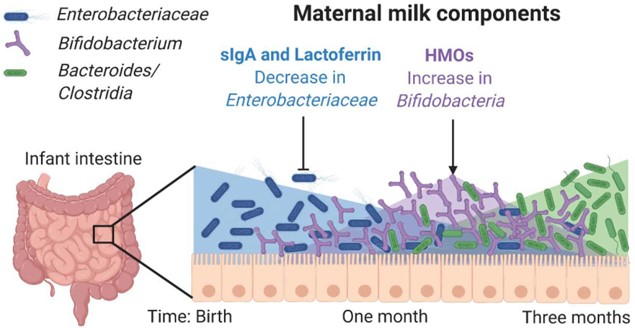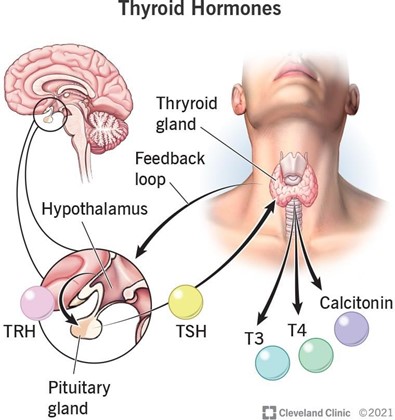A newborn is protected against certain digestive and respiratory infections by IgA received via the mother:
Blood.
Placenta.
Milk.
Intestine.
The Correct Answer is C

A newborn is protected against certain digestive and respiratory infections by IgA received via the mother’s milk.
IgA is the main antibody found in breast milk, and it coats and seals the baby’s respiratory and intestinal tract to prevent germs from entering the body and bloodstream.
Choice A is wrong because the blood does not contain IgA, which is the main antibody that protects mucosal membranes.
Choice B is wrong because the placenta does not transfer IgA to the fetus, but only some other antibodies such as IgG.
Choice D is wrong because the intestine does not produce IgA in newborns, as they are born with low levels of IgA.
Nursing Test Bank
Naxlex Comprehensive Predictor Exams
Related Questions
Correct Answer is C
Explanation
The thyroid gland secretes triiodothyronine (T3), which is one of the two main thyroid hormones that affect almost every physiological process in the body.

T3 is the more metabolically active hormone produced from thyroxine (T4), which is the other thyroid hormone.
Choice A is wrong because the adrenal gland secretes hormones such as cortisol, adrenaline, and aldosterone, which are involved in stress response, blood pressure regulation, and metabolism.
Choice B is wrong because the pancreas secretes hormones such as insulin, glucagon, and somatostatin, which are involved in blood glucose regulation and digestion.
Choice D is wrong because the parathyroid gland secretes parathyroid hormone (PTH), which is involved in calcium and phosphate homeostasis.
Normal ranges for T3 levels vary depending on the laboratory and the method of testing, but they are usually between 100 and 200 nanograms per deciliter (ng/dL) for total T3 and between 2.3 and 4.2 picograms per milliliter (pg/mL) for free T.
Correct Answer is A
Explanation
Capillary walls consist of a single layer of epithelial cells, and they exchange substances in the blood for substances in the tissue fluid surrounding body cells.
This single layer of cells is called the endothelium and it forms the barrier between the blood and the interstitial fluid.
The endothelium can be either continuous or fenestrated, depending on the tissue type and function.
The capillaries are very thin and allow red blood cells to flow through them single file.
The capillaries also have a layer of a glycoprotein called the glycocalyx that covers their luminal surface.
Choice B. False is wrong because it contradicts the definition and structure of capillaries.
Capillaries are not made of multiple layers of cells, nor do they prevent the exchange of substances between the blood and the tissue fluid.
Whether you are a student looking to ace your exams or a practicing nurse seeking to enhance your expertise , our nursing education contents will empower you with the confidence and competence to make a difference in the lives of patients and become a respected leader in the healthcare field.
Visit Naxlex, invest in your future and unlock endless possibilities with our unparalleled nursing education contents today
Report Wrong Answer on the Current Question
Do you disagree with the answer? If yes, what is your expected answer? Explain.
Kindly be descriptive with the issue you are facing.
